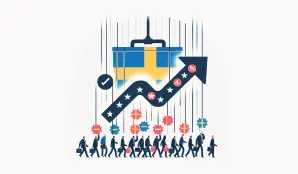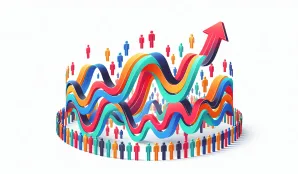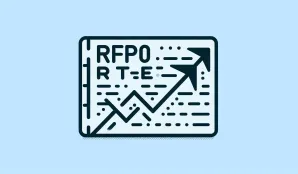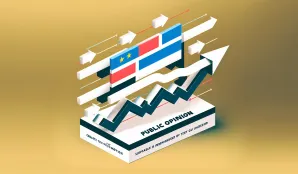Inflation
- Articles
- Inflation
New Inflation Data: KPIF at 1.7% - What Does It Mean for Swedish Households?
The latest inflation report from Statistics Sweden (SCB) shows that inflation measured by KPIF (Consumer Price Index with fixed interest rate) is at 1.7% for August 2024. This is an increase from 1.3% in June, but still below the Riksbank's target of 2%. At the same time, the CPI inflation stands at 2.6%, unchanged from the previous month.
Inflation Trends and Riksbank's Decisions
Inflation has shown a clear downward trend over the past two years. In early 2023, KPIF inflation was as high as 9.4%, but has since steadily declined. The current level of 1.7% marks a significant improvement, but it is important to note that CPI inflation still remains slightly higher at 2.6%.
The repo rate, which is the Riksbank's primary tool for controlling inflation, currently stands at 3.75%. It has been held steady since April 2024 after being at 4% in the first quarter of the year. With the latest inflation data, we can expect the Riksbank to consider adjusting the interest rate to further stabilize the economy.
How Does This Affect Household Finances?
For households with mortgages and personal loans, the interest rate is a critical factor. Here is a calculation of what a mortgage might cost at different loan amounts, based on the current repo rate of 3.75% and an assumed bank markup of 1%:
Mortgage Calculation
- Mortgage of 1 million SEK: 3.75% + 1% = 4.75% interest rate. Monthly payment: around 4,167 SEK.
- Mortgage of 3 million SEK: 3.75% + 1% = 4.75% interest rate. Monthly payment: around 12,500 SEK.
- Mortgage of 5 million SEK: 3.75% + 1% = 4.75% interest rate. Monthly payment: around 20,833 SEK.
For personal loans, which often carry higher interest rates than mortgages, we can expect rates to range between 6-10% depending on the loan amount and creditworthiness.
Food Prices, Fuel Prices, and Energy Prices
Inflation also impacts the prices of goods and services. With stabilized inflation, we can anticipate that food prices will not rise as rapidly as before. Fuel prices, often volatile, may also stabilize, which is good news for car owners. Energy prices, which have been high in recent years, may start to decline if inflation remains under control.
Economic Forecasts Ahead
Economic experts predict that if inflation continues to stay below the Riksbank's target, we may see a reduction in the repo rate in the coming months. This would mean lower borrowing costs for households and businesses, potentially further stimulating the economy.
In conclusion, the latest inflation data indicates a continued stabilization of the Swedish economy. Households can expect more stable prices for goods and services, and possibly lower interest rates on their loans in the future.
Sweden's national debt
-

Save Big with Vimla – Mobile Plan for 20 SEK/Month + 100 GB Extra Data
Wed, 4 Mar 2026 - 22:00 -

Opinion Poll: Demoskop February 2026 – Center increases, S still largest
Fri, 27 Feb 2026 - 09:35 -

Policy rate remains at 1.75% – Riksbank signals stability
Thu, 29 Jan 2026 - 14:02













